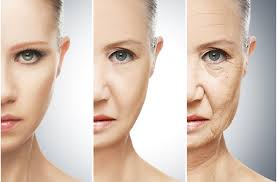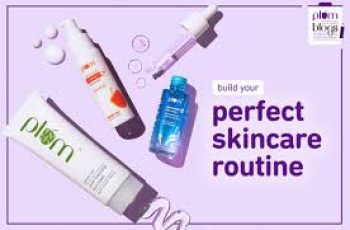
This Skincare Routine Will Transform Your Face
You’ve read the beauty blogs and decided on their top picks – cleanser, toner, serum, moisturizer, eye cream – and if you use them every day, your skincare routine is good…right?
We hate to be the bearer of bad news, but if you don’t know how to apply them in a specific order, it’s time to rethink.
We know that when we spend a ton of money on skincare, we want that product to work to its full potential. It turns out that to do that, we need to apply them in a specific order and not rush through them.
To share our knowledge, we’ve put together a comprehensive set of steps and products that work for all skin types. You don’t have to have everything on this list, but you should follow this order.
Daytime and Nighttime Routine
To keep it simple, unless you have two products in each category, your skincare routine will be roughly the same in the morning and at night.
1. Cleansing Products
For products to work, you need to get your skin looking fresh – and that’s where cleansing comes into play.
Everyone should cleanse themselves in the morning and especially at night. When you go out, your face isn’t just covered in makeup (if you wear any), it’s also covered in dirt.
Although you’re exposed to less environmental exposure at night, your skin can still sweat and accumulate bacteria while you sleep.
How does it work?
Wash your hands.
Gently massage cleanser into your skin for about 1 minute.
Wash off with warm water.
Pat dry with a clean towel.
Pro tip: Try double cleansing at night. First use a non-comedogenic oil (jojoba works well) or oil-based cleanser to remove your makeup. Then use a water-based cleanser.
Water-based or oil-based cleansers
Oil-based products are best for removing makeup and sunscreen residue, while water-based products are best for removing dirt and sweat.
“The cleanser depends on your skin type, and the most important thing is to choose a product that’s right for you,” explains Ophelia Veraitch, a dermatologist at the Cranleigh Clinic. “For example, if you have acne, you should avoid soap-based or foaming cleansers because they increase oil production.”
2. Toners and serums
Toner formulas vary. Depending on the product, they can remove dead skin cells, clear clogged pores, and/or help brighten the skin and restore its pH.
“If you’re willing to use a product with active ingredients and moisturizer, using a toner can remove any cleansers and leave your skin feeling fresh,” says Dr. Villach.
Serums are similar to toners, but are lighter in texture and are usually used to moisturize.
In general, toners and fragrances are optional. Depending on your skin type, you may or may not see results.
Pro tip: If you have oily skin, try an astringent toner. If you use hyaluronic acid later in your routine, follow up with a hydrating toner.
3. Eye cream
Eye creams can combat fine lines and dark circles under the eyes. “Here you should use a thinner eye cream because the skin around the eyes is thinner,” says Dr. Villach.
Consider eye creams as an optional step in your routine, as they are often very expensive. Using an eye serum can achieve similar results. However, make sure the ingredients aren’t too aggressive.
How did it go?
Since it’s a specific niche, you don’t need a lot. Take a small amount on your fingertips (apply with your ring finger) and gently pat around your eyes until absorbed.
Pro tip: If your eye cream contains retinol and you apply it in the morning, be sure to follow it up with sunscreen and reapply throughout the day.
4. Serums, including acids and retinols
Serums contain high concentrations of ingredients such as antioxidants and/or acids that target cell repair and protection. They are particularly effective for repairing sun-damaged skin and even skin tone.
However, the type of serum you want to use also depends on the active ingredients you used previously in the toner/serum phase. Active ingredients refer to anything that can transform the skin, such as acids, retinols, and vitamins.
“If you use a product with active ingredients, you have to wait a few minutes before applying the next product,” adds Dr. Vilaci. “Otherwise, you’re actually diluting the active ingredient and it’s not as effective.”
Day serums
Your daily serum should focus on hydration and protection. Daily serums often contain acids like hyaluronic acid, salicylic acid, and L-ascorbic acid (vitamin C).
These ingredients promote cell turnover and rejuvenation, helping to improve everything from spots and wrinkles to skin tone and scars.
Night Serums
Your night serum should focus on repairing and renewing skin cells. You can use an acid serum at night, but if retinol is on the list, use it.
“Retinol should be used at night because it makes your skin more sensitive to the sun,” explains Dr. Andrew Birnie, consultant dermatologist and founder of Ritalin Sunscreen.
Retinol is a synthetic form of vitamin A. This powerful ingredient stimulates cell production and fights signs of aging.
When using retinol, you should take your time. “Retinol products are more likely to cause irritation and need to be used more frequently,” says Dr. Birnie. “Use every few days or every other day, then work up to daily.”
Pro tip: Start with 0.3% to 0.5% retinol, advises Dr. Virage. That may be enough for your skin. Then try increasing the ratio to 1%.
5. Spot Treatments
Spot treatments target acne, dark spots, and blemishes. If you’re lucky enough to have skin clearer than Caribbean water, go for it.
Pro tip: While some topical treatments are great for morning use, many work best at night because your body begins to repair itself while you sleep.
How does it go?
If your topical treatment contains salicylic acid or lactic acid, focus on your T-zone, Dr. Villach says. Or wherever your spots are. If it’s a gentler formula, it’s fine to apply it anywhere.
Avoid using the product on the skin around your eyes, she adds.
6. Moisturizer
No matter how many serums you have, “everyone can benefit from using [moisturizer],” says Dr. Villach. It’s important for protecting the skin’s natural barrier and retaining moisture.
However, which formula is best depends on your skin type. If you have dry skin, a cream is a good choice. However, if you have oily skin or are prone to rosacea or acne, a cream would be better, she explains.
7. Facial Oil
Your skin already produces its own oil, called “sebum,” so depending on your skin type, you may not need a facial oil. Dr. Villach says. Filacher doesn’t recommend them to her clients because she’s found in her practice that they cause more problems than benefits.
However, everyone is different. People with dry or dehydrated skin may find that using a facial oil product helps boost sebum production, especially when it comes to hydrating and protecting the skin’s natural barrier.
Typically, these products contain a variety of different oils. However, the most popular ingredients include squalane, jojoba, marula, argan, and rosehip: all rich in beneficial antioxidants and anti-inflammatory properties.
8. Sunscreen (for the day) or heavy cream (for the night)
Sun protection is the most important step in your daily routine. Not only does it help prevent sunburn (which can eventually develop into skin cancer), but it also helps prevent cumulative sun damage.
“Every time you go outside, a little bit of sun or UV rays hits your skin,” explains Dr. Birnie, “and it keeps accumulating throughout your life.”
This can lead to the formation of cancer cells, sunspots, wrinkles, and general signs of aging on the surface of your skin.
Night Cream
A night cream is essentially a rich moisturizer. “It keeps your skin hydrated and helps improve the appearance of fine lines,” says Dr. Villach.
Night cream is an optional step, but it’s something to consider once you’re 30.
“As you age, it’s important to use a night cream,” Villach said. “As you age, oil production decreases, so you need that extra hydration.”


